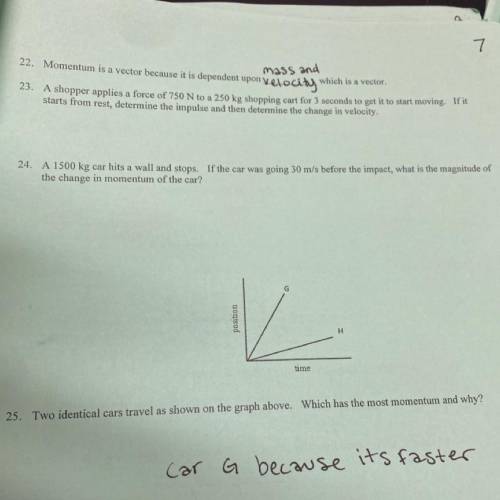
Physics, 01.06.2021 22:10 zitterkoph
Who can answer 23.,and 24. Pls help, I’ll give brainliest for the correct answer and explanation


Answers: 2


Another question on Physics

Physics, 22.06.2019 08:30
Does anyone know how to solve this problem? i really need . i made an attempt but i just cant get it. a metal rod is 25.000 cm long at 25.0 degrees celsius. when heated to 102.0 degrees celsius, it is 25.054 cm long. what is the coefficient of linear expansion for this metal.
Answers: 3

Physics, 22.06.2019 12:30
Apositive charge moves in the direction of an electric field. which of the following statements are true? check all that apply. check all that apply. 1.the potential energy associated with the charge decreases. 2. the electric field does positive work on the charge. 3. the electric field does negative work on the charge. 4. the potential energy associated with the charge increases. 5. the electric field does not do any work on the charge. 6. the amount of work done on the charge cannot be determined without additional information.
Answers: 1

Physics, 22.06.2019 14:40
During the experiment if you could triple the breakaway magnetic force with all other quantities left unchanged, what is the new value for the critical velocity if it was v0 (initial velocity), initially? (b) now if you halved the radius with all other quantities left unchanged, what is the new critical velocity if it was v0 (initial velocity), initially? (c) if during the experiment, critical velocity quadrupled with all other quantities left unchanged, what is the new breakaway force if its magnitude was initially f0,?
Answers: 1

Physics, 22.06.2019 19:30
Assume that two of the electrons at the negative terminal have attached themselves to a nearby neutral atom. there is now a negative ion with a charge -2e at this terminal. what are the electric potential and electric potential energy of the negative ion relative to the electron? the electric potential and the electric potential energy are both twice as much. the electric potential is twice as much and the electric potential energy is the same. the electric potential is the same and the electric potential energy is twice as much. the electric potential and the electric potential energy are both the same. the electric potential is the same and the electric potential energy is increased by the mass ratio of the oxygen ion to the electron. the electric potential is twice as much and the electric potential energy is increased by the mass ratio of the oxygen ion to the electron.
Answers: 3
You know the right answer?
Who can answer 23.,and 24. Pls help, I’ll give brainliest for the correct answer and explanation
Questions

Mathematics, 22.04.2020 21:53

Mathematics, 22.04.2020 21:53

English, 22.04.2020 21:53

Mathematics, 22.04.2020 21:53

History, 22.04.2020 21:53

Mathematics, 22.04.2020 21:53




History, 22.04.2020 21:53




History, 22.04.2020 21:53

Biology, 22.04.2020 21:53

Geography, 22.04.2020 21:53



English, 22.04.2020 21:53



